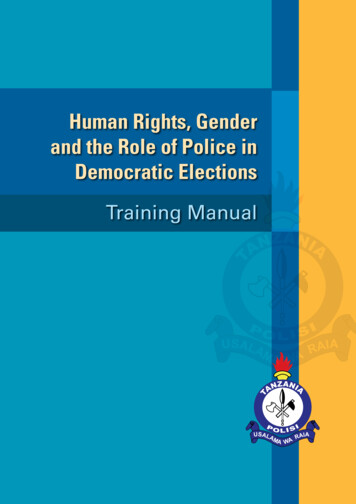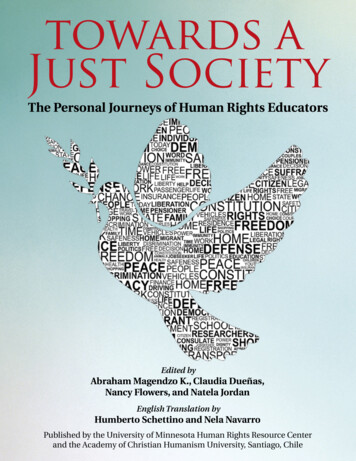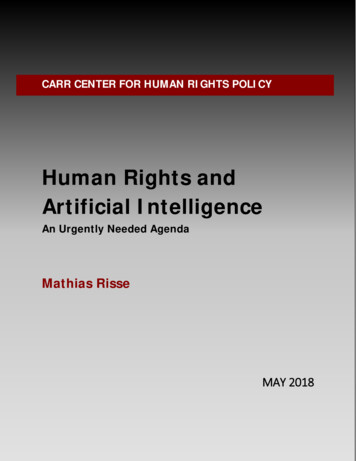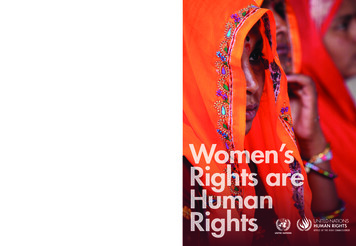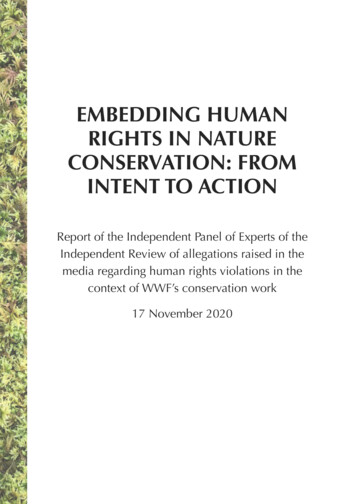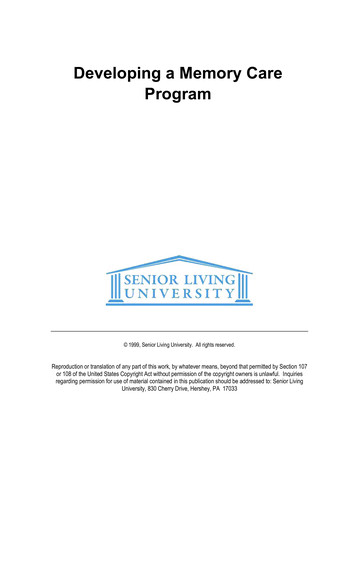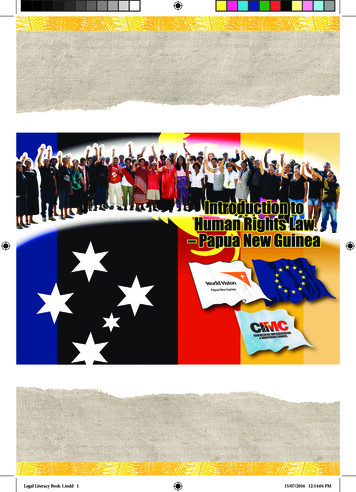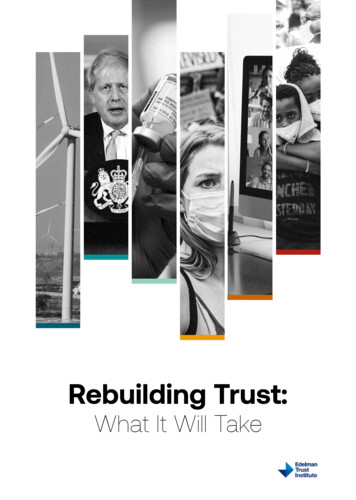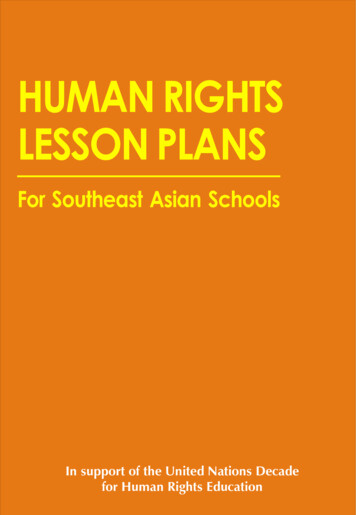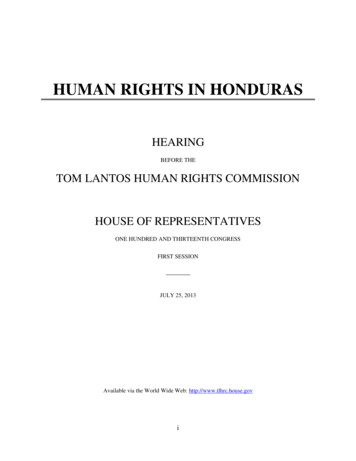
Transcription
HUMAN RIGHTS IN HONDURASHEARINGBEFORE THETOM LANTOS HUMAN RIGHTS COMMISSIONHOUSE OF REPRESENTATIVESONE HUNDRED AND THIRTEENTH CONGRESSFIRST SESSIONJULY 25, 2013Available via the World Wide Web: http://www.tlhrc.house.govi
TOM LANTOS HUMAN RIGHTS COMMISSIONJAMES P. McGOVERN, Massachusetts, Co-chairmanFRANK R. WOLF, Virginia, Co-chairmanJAN SCHAKOWSKY, IllinoisDONNA EDWARDS, MarylandKEITH ELLISON, MinnesotaSUZANNE BONAMICI, OregonCHRIS SMITH, New JerseyJOSEPH R. PITTS, PennsylvaniaTRENT FRANKS, ArizonaJEFF DUNCAN, South CarolinaJANICE KAGUYUTAN, Democratic Staff DirectorKALINDA STEPHENSON, Republican Staff DirectorKATYA MIGACHEVA, Lead/James Marshall Public Policy FellowJAMES “J.P.” SHUSTER, Law FellowXAVIER BILLINGSLEY, Charles B. Rangel International Affairs FellowCHRISTINE DONFRANCESCO, Democratic InternDENISE BELLii
CONTENTS--------------WITNESSESSenator Timothy M. Kaine . . .4Ms. Lisa Haugaard, Executive Director, Latin America Working Group .11Dr. Dana Frank, Professor of History, University of California Santa Cruz . .26Ms. Viviana Giacaman, Director for Latin America Programs, Freedom House . . .42Ms. Tirza Flores Lanza, Lawyer, Former Magistrate of the Court of Appeals for San Pedro Sula .50LETTERS, STATEMENTS, ETC., SUBMITTED FOR THE HEARINGPrepared Statement of Timothy M. Kaine . 6Prepared Statement of Lisa Haugaard 14Prepared Statement of Dana Frank . . 29Prepared Statement of Viviana Giacaman .45Prepared Statement of Tirza Flores Lanza (Español) 52Prepared Statement of Tirza Flores Lanza (English) .55APPENDIXHearing Notice . . .64iii
HUMAN RIGHTS IN HONDURASTHURSDAY, JULY 25, 2013HOUSE OF REPRESENTATIVES,TOM LANTOS HUMAN RIGHTS COMMISSION,Washington, D.C.The commission met, pursuant to call, at 10:30 a.m., in Room 2255 Rayburn HouseOffice Building, Hon. James P. McGovern [co-chair of the commission] presiding.Mr. McGovern. Okay, we are going to begin a little bit earlier because we want to geteveryone in and they are going to call votes at some point and I want to make sure. I have anopening statement and I will yield to Senator Kaine.I want to thank everybody for being here this morning. I want to thank you for attendingthis important hearing on human rights in Honduras. I want to thank JP Shuster and the staff ofthe Tom Lantos Human Rights Commission for organizing this hearing today. I also want tothank our witnesses, some of whom have traveled from Honduras to be here with us thismorning. I appreciate it. I want to thank you for being here to testify and for everything that youdo to promote and protect human rights in Honduras.As a long-time follower of events in Latin America, I am especially honored to engageour distinguished witnesses on the current human rights situation in Honduras. The past fewyears have been difficult and turbulent ones for the people of Honduras. As many of you know,in June 2009, a coup ousted then-President Manuel Zelaya from office and Roberto Michelettiwas appointed interim president. During the period of the Micheletti administration, the humanrights situation deteriorated considerably. Public demonstrations were often met with adisproportionate use of force and many people were arbitrarily detained and held in cruel,inhuman, and degrading conditions. Honduras became increasingly militarized and there was asurge in racial and gender discrimination across the country, among other grave violations ofcivil and political rights.Regrettably, security and human rights in Honduras have not improved since PresidentLobo was elected in November of 2009. And if anything, they have deteriorated. As was widelypublicized last year, Honduras gained the unwanted title of being the homicide capital of theworld with 86 murders per 100,000 people and is viewed as one of the most dangerous in theworld right now.Remember, this is not a country fighting a civil war. It is not somewhere on the otherside of the world. Honduras is a neighbor, an ally, and a friend. Among the most wearingaspects of this violence and one I am particularly interested in examining today is the severethreat to oppress freedom and the protection of journalists in Honduras.According to Honduras' own National Commission for Human Rights, at least 36journalists and social commentators have been killed since 2003 with 29 of the murdersoccurring during the current Lobo administration. In the most recent case, the charred andmutilated body of radio journalist Anabel Barrow was discovered just two weeks ago on a river1
bank near the city of San Pedro Sula. Exactly one year ago today during a Commission hearingon global press freedom, we heard testimony from Jesuit priest Ismail Moreno Coto, also knowas Father Melo who works for the Catholic community radio station, Radio Progreso. Less thantwo weeks after he returned to Honduras, Radio Progreso was raided by Honduran police andreporters and local campesinos who were there being interviewed were threatened. This was notan extreme or unusual case, but rather the norm faced by many journalists in Honduras.So I am deeply concerned about the role that the police and military units have played inHonduras' on-going human rights crisis. Elements of the Honduran police are alleged to becarrying out extrajudicial killings of suspected gang members and other perceived criminals aspart of the so-called social cleansing operations. Honduran police chief Juan Carlos Bonilla hasbeen linked to 3 homicides and 11 other deaths of disappearances while many of the country'spolice are suspected to be involved in organized crime. Most troubling for me is the fact that theUnited States may be bolstering these very same offenders through our foreign assistance whichincludes 16 million to fund Honduras police units so far this year.This is not a new problem. In May of 2011, I felt obligated to leave a letter with 86members of Congress asking the State Department to suspend U.S. assistance to the military andpolice in Honduras due to the lack of any mechanism to ensure security forces are heldaccountable for abuses. Last month, my colleagues in the Senate called into serious question theState Department's certification of Fiscal Year 2012 funds designated for Honduran military andpolice. That certification effectively told the Honduran government that U.S. human rightsconditions in the FY 2012 appropriation bills were sufficiently met. I think this appears far oftenthe case.I am also concerned about the rule of law in Honduras and especially the justice sector'sinability to investigate crimes and capture, try, and convict those responsible. These are allimportant issues to discuss in light of critical U.S.-Honduras strategic dialogue which Iunderstand is scheduled for next week.In a National Public Radio story broadcast earlier this month about soaring corruptionamong Honduras police ranks, the interviewer spoke with the mother of a young man who hadgone out to a store one night and was found at 4 o'clock in the morning with two bullets in theback of his head. She told the reporter, we are plagued with questions. We want to know whathappened, why it happened. Her enormous suffering is made more severe with the knowledge ofonly two percent of crimes are solved in Honduras.So we are here today because we owe it to that mother to ask those same questions, whatis happening, and why is it happening. As a government that provides assistance to theHonduran government, we are also obligated to ask what the U.S. can do to improve humanrights' protections for the people of Honduras.Finally, on a sadder note, I wanted to take a moment to recognize that just yesterday,Honduran Judge Mareya Mendoza Peña, a member of the Executive Committee of the HonduranAssociation of Judges for Democracy was assassinated in Honduras in broad daylight. She wasmurdered while driving her car by two men on a motorcycle who sprayed her vehicle with 20bullets according to the initial media reports. I wish to express my deepest sympathies to herfamily, friends, colleagues, and loved ones, some of whom are here today. Our thoughts andprayers are with all of you.And I call on the Honduran authorities to investigate and bring to justice the perpetratorsof this heinous crime.With that, I want to acknowledge my colleague, Congressman Frank Wolf, the co-chair2
of this commission from Virginia, if he has an opening comments?Mr. Wolf. Just briefly, I want to thank the chairman and identify with your comments. Iwant to welcome Senator Kaine. I know he has a lot of experience.Also, I am interested -- I had a daughter who did the same thing. She worked down inHonduras for two years, taught. And I went down there to visit her a number of times and I thinkthe very fact what you are trying to do, we should send a very, very, very strong message. Andso I appreciate Tim coming over and testifying. I yield.Mr. McGovern. It is now my pleasure to welcome our first witness, Senator Tim Kaine,who represents the people of the Commonwealth of Virginia. Senator Kaine is a long-timeadvocate for justice and peace in Honduras. We are especially grateful that you are here to shareyour perspective on these critical issues. The floor is yours.3
STATEMENT OF HON. TIMOTHY M. KAINE, A UNITED STATES SENATOR FROM THESTATE OF VIRGINIASenator Kaine. Thank you, Co-Chair McGovern and Co-Chair Wolf and members of theCommission and especially to the witnesses who will testify to follow me. I very muchappreciate the opportunity to testify in front of the Tom Lantos Human Rights Commission onthis very important issue. It is important to the people of Honduras. It is import to the thousandsand thousands of Honduran-Americans who live in Virginia and in the United States. It isimportant to our U.S. foreign policy, but it is also personally important to me. I especially wantto thank you both for your invitation to be here today. Congressman Wolf is the senior memberof the Virginia delegation and I am the junior member, but I much admire his focus on theseissues and love working together with him on them.Over 30 years ago, I took a year off from law school to live in El Progreso, Honduras andworked with Jesuit missionaries there, the same Jesuit missionaries who courageously operatedRadio Progreso now for about four decades. It was 1980 and all of Central America was very,very dangerous in 1980. There was a military dictatorship in power in Honduras. It was the tailend of the Cold War. Civil wars in El Salvador and Guatemala were pouring refugees across theborder into the part of Honduras where I lived. The United States was using the southern part ofthe country as a staging ground for the conflict in Nicaragua. My Jesuit colleagues lived undertremendous threat. So many were threatened. Some were imprisoned and a few even lost theirlives during those years.Once I left Honduras, I stayed in touch and engaged with the Jesuit community inHonduras and was able to visit again in 2004 to introduce my friends in Honduras to my wife,Ann. The experience in Honduras really shaped my world view and the person I am today. Ittaught me a lot about faith. It taught me a lot about faith's capacity to overcome adversity. Ittaught me a lot about the way many people in the world live very different than I had grown upin terms of levels of material comfort. But it also taught me a lot about this country. As a youngman there, I was able to appreciate more the safety and freedoms of the United States.Particularly in the early 1980s with the military dictatorship, Honduran citizens didn't have theopportunity to vote. That has made me take voting and our democratic institutions moreseriously as an adult. And that is why what has happened in Honduras over the subsequentdecades is so troubling.In the early 1980s, it was a military dictatorship. The country has transitioned todemocracy, but it is less safe today, sadly. We would hope that the transition to democracywould improve safety and liberty and in some ways it seems that it has gone significantlybackward. Honduras faces huge human rights challenges.The witnesses to follow will give probably more up-to-date and focused testimony than Iwill, but you know the general security situation in the country has so deteriorated. Humanrights abuses including attacks on the press, extrajudicial killings by security forces havedramatically increased. Over the last decade, homicide rates have skyrocketed. As CoChairman McGovern indicated in 2012 Honduras had the highest homicide rate in the world.This friend, this ally, this country that has been such a reliable partner with the United States,highest homicide rate in the world with 86 murders for 100,000 residents.Here is something that I find particularly compelling. It is hard to find anotherrelationship in the 50-year history of the Peace Corps that has been as strong as the relationshipbetween the United States and Honduras, but due to violence, the United States has suspended4
Peace Corps operations after 50 years of strong partnership. Some of this has to do with lack ofcapacity and lack of resources. Obviously, it has to do with the drug trade and demand for drugswhich we continue to have to try to reduce in this country. But the troubling part is corruption inHonduran institutions and a lack of accountability for those responsible.The current administration, the Lobo administration, has taken a number of steps oftenunder U.S. and international pressure to improve human rights in Honduras. That is whyhearings like these are so important. To continue the attention on these issues is absolutelycritical. For example, in January 2013, the Lobo administration adopted a new human rightspolicy and plan of action that has been drafted by the Secretariat for Justice and Human Rights.After extensive consultations with civil society, hearings like this and other hearings can havethe effect of encouraging more efforts, but many of the reform efforts today have stalled.Many have questioned whether the Lobo administration has the political will to carry outreforms necessary to clean up and strengthen the country's security forces and justice sectorinstitutions.Human rights organizations maintain that the president's efforts have been insufficient.The administration has failed to hold sufficiently accountable those responsible for attacks onvictims based solely on their profession or activism.The United States administration and Congress have pursued a number of policies toaddress this situation. The backbone of the administration's approach is the Central AmericanRegional Security Initiative, CARSI, which has allocated approximately 60 million toHonduras. Some of this funding has been used to set up a Special Victims Task Force toinvestigate attacks against journalists and other high profile violent crime cases. There has alsobeen support in the past for police reform, although progress on that reform has stalled.Just last Tuesday, I heard from the Jesuit community in Honduras with whom I maintaina very good communicative relationship. They recently translated an audit done of the specialprosecutor for human rights in Honduras with the hopes of pinpointing places where theHonduran government could invest to combat impunity in human rights abuses by stateauthority. The audit revealed that already this year the human rights special prosecutor hasreceived nearly 500 complaints of human rights abuses by state officials. There are other humanrights abuses, but more than 500 complaints of human rights abuses by state officials, theoverwhelming majority inflicted by police. Yet, there is only one investigator who is workingfull time and that investigator is detailed from the very police that he is tasked with investigating.I would encourage this commission and I would love to work on this as well to press theadministration to engage with the Honduran government as early as next week as a new publicprosecutor is chosen. This will be critical to ensuring accountability for state-sponsored humanrights infractions and creating some level of lifting confidence among the public that humanrights issues will be taken seriously.Some of the most disturbing individual cases that the Jesuit community in Hondurascontinues to follow involve the co-opting of state officials and entities to carry out the will ofpowerful private individuals, specifically mining company coercion and intimidation ofcampesino communities in the Tela municipality of Atlantida are disturbing. I do commend theState Department and the embassy in Tegucigalpa for responding to some of my concerns andthose of my friends in the Jesuit community of Honduras, but more needs to be done.When I heard that I would have the opportunity to serve on the Senate Foreign RelationsCommittee in the Senate, I saw it as an opportunity to work on foreign policy issues in theWestern Hemisphere. For too long, this is my own personal opinion, the U.S. has focused its5
foreign policy on an East-West axis rather than a North-South axis. And more needs to be doneto respect the fact that we have so many partnerships and so much work to be done on the NorthSouth axis.As a member of the Senate Foreign Relations Committee and a member of theSubcommittee on Western Hemisphere, I am proud to work on and hopefully raise the profile ofthese issues.Finally, let me just say this, I thank the Commission for your dedication, the very originsof this Commission are an expression of some powerful American values and the belief that ifwe shine a spotlight on abuses that is one of the most powerful things we can do. So manyvictims suffer because they are forgotten, they are not paid attention to, and if we can shine aspotlight, we can help them.Your dedication to educating members of Congress on the most pressing human rightsissues of the day is important. And I am honored to participate and have my testimony besubmitted for the record on the human rights situation in Honduras.So to my co-chairs, I thank you. I appreciate the invitation to come be with you todayand I look forward to doing any work together with you to address this serious concern.[The prepared statement of Senator Kaine follows:]Testimony to Tom Lantos Human Rights Commission: Human Rights in HondurasJuly 25, 2013Co-Chairman McGovern, Co-Chairman Wolf, Members of the Commission, I appreciatethe opportunity to testify in front of the Tom Lantos Human Rights Commissions on an issue thatis not only important to the people of Honduras, and United States foreign policy, but ispersonally important to me. I want to thank both of Representative McGovern andRepresentative Wolf for their dedication to shining a light on human rights issues that needCongressional attention.Over thirty years ago, I took a year off from law school to live in Honduras and workwith Jesuit Missionaries. It was 1980, and Central America was dangerous. There was amilitary dictatorship in power in Honduras. It was the tail-end of the Cold War. Civil wars in ElSalvador and Guatemala were pouring refugees into Honduras. The United States was using thenorthern part of the country as a staging ground for the conflict in Nicaragua. My Jesuitcolleagues lived under tremendous threat, and some were imprisoned and even lost their lives.6
Once I left Honduras, I stayed in touch and engaged with the Jesuit community inHonduras, and was able to visit again in 2004 with my wife Anne. My experience in Hondurasshaped my worldview. As a young man I was able to genuinely appreciate the safety andfreedoms of the United States. In the early 1980s in Honduras, citizens did not even have theopportunity to vote. That is why what has happened in Honduras over the subsequent decades isso troubling.As I said, in the early 1980s, a military dictatorship was in power in Honduras. And asthe country has transitioned to a democracy, it may be less safe today. Honduras facessignificant human rights challenges. As the general security situation in the country hasdeteriorated in recent years, human rights abuses—including attacks on the press andextrajudicial killings by security forces—have increased. Over the last decade, homicide rateshave sky-rocketed. In 2012, Honduras had the highest homicide rate in the world with 86murders per 100,000 residents. Due to violence, the United States has suspended Peace Corpsoperations in Honduras after nearly 50 years of productive partnership. Some of this has to dowith a lack of capacity and lack of resources, but the more troubling part is corruption inHonduran institutions, and a lack of accountability for those responsible.The Lobo Administration has taken a number of steps, sometimes under U.S. orinternational pressure, to improve human rights in Honduras. That is why hearings such as thisone are so important – continued attention on these issues can be effective. For example, inJanuary 2013, the Lobo Administration adopted a new human rights policy and plan of actionthat had been drafted by the Secretariat for Justice and Human Rights after extensiveconsultations with civil society. But many of the reform efforts have stalled.Some have questioned whether the Lobo Administration has the political will to carry out7
the reforms necessary to clean up and strengthen the country’s security forces and justice sectorinstitutions. Human rights organizations maintain that President Lobo’s efforts have beeninsufficient. His Administration has failed to hold accountable those responsible for attacks onvictims based solely on their profession or activism.The United States Administration and Congress have a pursued a number of policies toaddress the human rights situation in Honduras. The backbone of the Administration’s approachis the Central American Regional Security Initiative (CARSI), which has allocatedapproximately 60 million to Honduras. Some of this funding has been used to set up a SpecialVictims Task Force to investigate attacks against journalists and other high profile violent crimecases. There has also been support in the past for police reform, although progress has stalled.Just this past Tuesday, I heard from the Jesuit community in Honduras. They recentlytranslated an audit done of the Special Prosecutor for Human Rights in Honduras, with the hopesof pinpointing places where the Honduran government could invest to combat impunity inhuman rights abuses by state authorities. The audit revealed that already this year, the HumanRights Special Prosecutor has received nearly 500 complaints of human rights abuses by stateofficials -- the overwhelming majority inflicted by police. Yet there is only one dedicatedinvestigator who is working full time, and that investigator is detailed from the police that he istasked with investigating. I would encourage this Commission to press the Administration toengage with the Honduran government as a new Public Prosecutor is chosen. This will becritical to ensuring accountability for state-sponsored human rights infractions.Some of the most disturbing individual cases that the Jesuit community in Hondurascontinues to follow involve the coopting of State officials and entities to carry out the will ofpowerful private individuals. Specifically, mining company coercion and intimidation of8
campesino communities in the Tela municipality of Atlántida are disturbing. I do commend theState Department, and the Embassy in Tegucigalpa, for responding to some of my concerns andthose of my friends in the Jesuit community in Honduras. But more certainly can and needs tobe done.When I heard I would be serving on the Senate Foreign Relations Committee in theSenate, I saw it as an opportunity to work on foreign policy issues in the Western Hemisphere.For too long, the United States has focused its foreign policy on an east-west axis, often timesneglecting the north-south work that needs to be done. As a Member of the Senate ForeignRelations Committee, and member of the Western Hemisphere subcommittee, I am proud towork on, and raise the profile of, these issues.I thank the Commission for its continued dedication to the broader calling of educatingMembers of Congress on the most pressing human rights issues of the day, and I am honored toparticipate and have my testimony be submitted for the record for this hearing on the humanrights situation in Honduras.Thank you Co-Chairmen McGovern and Wolf, and members of the Commission.9
Mr. McGovern. Thank you very much for coming here. I think your presence here is asignal to the Honduran government that we are very concerned about the human rights situationin Honduras. And there must be something in the water in Virginia between you and Frank Wolfwhere there is a real passion for human rights which is really welcome here in the Congress.And while you are here I just want to acknowledge that Congresswoman Bonamici from Oregonand Congressman Farr from California came in while you were speaking. I know you have abusy schedule, but on behalf of the entire Commission I want to thank you for being here and itis important testimony. Thank you.Just to kind of let you know what is going on. They called a series of votes just now andwe are here to hear from Lisa Haugaard, the Executive Director of Latin America WorkingGroup; Dr. Dana Frank, Professor of History at the University of California-Santa Cruz; Ms.Tirza Flores Lanza, a lawyer, former Magistrate of the Court of Appeals for San Pedro Sula; andMs. Viviana Giacaman, the Director for Latin America Programs, for Freedom House.So what I am going to suggest we do because -- the panel can make yourself comfortableup here, but we are going to have go for votes. We will come back as soon as the votes are over.I know I will. I know some others have to catch planes, but does that make -- okay. So we aregoing to go on hold. I am sorry, but we don't control these votes. Thank you. We will be back.[Recess]Mr. McGovern. So I have introduced everybody, so why don't we begin with LisaHauggard, the Executive Director of the Latin America Working Group. And appreciate yourpatience. Thank you.Ms. Haugaard.10
STATEMENT OF LISA HAUGGARD, EXECUTIVE DIRECTOR, LATIN AMERICAWORKING GROUP; DR. DANA FRANK, PROFESSOR OF HISTORY, UNIVERSITY OFCALIFORNIA-SANTA CRUZ; MS. VIVIANA GIACAMAN, DIRECTOR, LATIN AMERICAPROGRAMS, FREEDOM HOUSE; AND MS. TIRZA FLORES LANZA, LAWYER,FORMER MAGISTRATE OF THE COURT OF APPEALS FOR SAN PEDRO SULASTATEMENT OF LISA HAUGGARDMs. Haugaard. Thanks to the honorable co-chairs of the Tom Landis Human RightsCommission for hosting this important hearing and for the opportunity to testify today.The situation of human rights in Honduras is critical. The 2009 coup undermined alreadyweak institutions intended to protect the citizenry. The Honduran state is failing to protect itscitizens in fundamental ways. The government fails to provide effective protection measures forthose at risk. The police not only fail to investigate crimes, some members are implicated incorruption and murder. And the judicial system is failing to achieve justice.The international community can only help Honduras by fully recognizing the extent ofthe challenges, working with civil society for change and adhering to a strong and principledhuman rights policy.Senator Kaine and Mr. McGovern mentioned the problems of violence in Honduras.Indeed, street crime and organized crime are responsible each for a significant share of violence.As drug interdiction in the Caribbean and Mexico disrupted drug routes, trafficking throughHonduras increased bringing with it higher levels of violent crime. And that means effectivecrime prevention strategies including education and job programs that help young people stayout of gangs and programs to reduce the high rate of domestic violence among other kinds ofprograms.But it would be a real mistake to look at the surge of violence and describe it as justordinary crime or drug violence. Journalists, members of the LGBT communities, small farmeractivists, lawyers, human rights defenders, and opposition activists are among the victims oftargeted crime. This targeted violence is a legacy of the coup.During the coup and in the months the de facto government ruled, civil liberties weresuspended. Police and soldiers violently repressed protests. The army occupied radio stations.Arbitrary detentions were carried on a sweeping scale and people were brutally beaten indetention. A human rights defender told me after the coup people had the idea they could dowhatever they wanted, no holds barred. The coup unleased violence and a sense that anyauthority or anyone who felt entitled in any way could do whatever they wished withoutconsequences.The elections that brought Porfirio Lobo to office were seen as illegitimate by somesectors of the Honduran public and many governments, although they were recognized by theUnited States. After taking office in January 2010, as Senator Kaine mentioned, the Loboadministration has taken some steps intended to strengthen human rights. For example, itestablished a Ministry of Justice and Human Rights which developed an national action plan forhuman rights. A Truth in Reconciliation Commission was launched to investigate the 2009ouster of President Zelaya. That commission concluded that a coup had taken place and thathuman rights violations by police and military were widespread following the coup. However,almost no one has been held accountable for these abuses and moreover, serious human rightsabuses continue.Now I am going to talk about the abuses under the current government. First, violent11
repression of protests continues. For examp
The commission met, pursuant to call, at 10:30 a.m., in Room 2255 Rayburn House Office Building, Hon. James P. McGovern [co-chair of the commission] presiding. . this is not a country fighting a civil war. It is not somewhere on the other side of the world. Honduras is a neighbor, an ally, and a friend. . prayers are with all of you.
